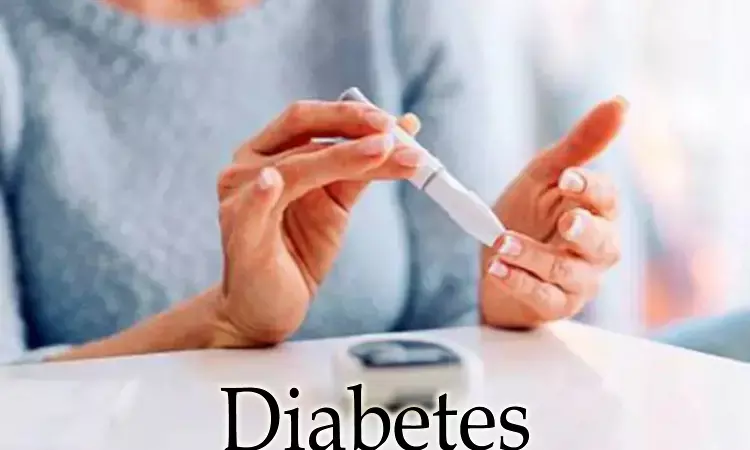- Home
- Medical news & Guidelines
- Anesthesiology
- Cardiology and CTVS
- Critical Care
- Dentistry
- Dermatology
- Diabetes and Endocrinology
- ENT
- Gastroenterology
- Medicine
- Nephrology
- Neurology
- Obstretics-Gynaecology
- Oncology
- Ophthalmology
- Orthopaedics
- Pediatrics-Neonatology
- Psychiatry
- Pulmonology
- Radiology
- Surgery
- Urology
- Laboratory Medicine
- Diet
- Nursing
- Paramedical
- Physiotherapy
- Health news
- Fact Check
- Bone Health Fact Check
- Brain Health Fact Check
- Cancer Related Fact Check
- Child Care Fact Check
- Dental and oral health fact check
- Diabetes and metabolic health fact check
- Diet and Nutrition Fact Check
- Eye and ENT Care Fact Check
- Fitness fact check
- Gut health fact check
- Heart health fact check
- Kidney health fact check
- Medical education fact check
- Men's health fact check
- Respiratory fact check
- Skin and hair care fact check
- Vaccine and Immunization fact check
- Women's health fact check
- AYUSH
- State News
- Andaman and Nicobar Islands
- Andhra Pradesh
- Arunachal Pradesh
- Assam
- Bihar
- Chandigarh
- Chattisgarh
- Dadra and Nagar Haveli
- Daman and Diu
- Delhi
- Goa
- Gujarat
- Haryana
- Himachal Pradesh
- Jammu & Kashmir
- Jharkhand
- Karnataka
- Kerala
- Ladakh
- Lakshadweep
- Madhya Pradesh
- Maharashtra
- Manipur
- Meghalaya
- Mizoram
- Nagaland
- Odisha
- Puducherry
- Punjab
- Rajasthan
- Sikkim
- Tamil Nadu
- Telangana
- Tripura
- Uttar Pradesh
- Uttrakhand
- West Bengal
- Medical Education
- Industry
Poor blood sugar control and longer diabetes duration tied to CVD, death risk: Study

China: People with poor blood sugar control and longer diabetes duration are at increased risk of cardiovascular disease (CVD) and mortality, finds a recent study in the journal Diabetes, Obesity & Metabolism. This implies that clinicians should also consider diabetes duration in addition to glycemic control in CVD risk assessment for diabetes patients.
Highest risk was seen in people with a diabetes history of 15 years or longer and an A1c level of 8 or greater.
Fu-Rong Li, Southern Medical University, Guangzhou, Guangdong, China, and colleagues aimed to assess the associations of diabetes duration and glycemic control (defined by plasma glycated hemoglobin [HbA1c] levels) with CVD risk and all-cause mortality and to determine whether the addition of either or both to the established CVD risk factors can improve predictions.
The study included a total of 435,679 participants from the UK Biobank without CVD at baseline. Cox models adjusting for classical risk factors (sociodemographic and anthropometric characteristics, lipid profiles and medication use) were used, and the predictive utility was determined by the C-index and net reclassification improvement (NRI).
Key findings of the study include:
· Compared with participants without diabetes, participants with longer diabetes durations and poorer glycemic control had a higher risk of fatal/nonfatal CVD.
· Among participants with diabetes, the fully-adjusted hazard ratios (HRs) and 95% confidence intervals (CIs) for diabetes durations of 5 to <10 y, 10 to <15 y and ≥ 15 y were 1.15, 1.50 and 2.22, respectively, compared with participants with diabetes durations <5 y; in addition, those with the longest disease duration (≥15 y) and poorer glycemic control (HbA1c ≥8% [53 mmol/mol]) had the highest risk of fatal/nonfatal CVD (HR 3.12).
· Among participants with diabetes, the addition of both diabetes duration and glycemic control levels significantly improved both the C-index (change in C-index +0.0254) and the overall NRI for fatal/nonfatal CVD (0.0992) beyond the use of the classical risk factors.
"Both a longer diabetes duration and poorer glycemic control were associated with elevated risks of CVD and mortality. Clinicians should consider not only glycemic control but also diabetes duration in CVD risk assessments for participants with diabetes," concluded the authors.
The study titled, "Diabetes Duration and Glycemic Control as Predictors of CV Disease and Mortality," is published in the journal Diabetes, Obesity & Metabolism.
DOI: https://dom-pubs.onlinelibrary.wiley.com/doi/epdf/10.1111/dom.14348
Dr Kamal Kant Kohli-MBBS, DTCD- a chest specialist with more than 30 years of practice and a flair for writing clinical articles, Dr Kamal Kant Kohli joined Medical Dialogues as a Chief Editor of Medical News. Besides writing articles, as an editor, he proofreads and verifies all the medical content published on Medical Dialogues including those coming from journals, studies,medical conferences,guidelines etc. Email: drkohli@medicaldialogues.in. Contact no. 011-43720751


